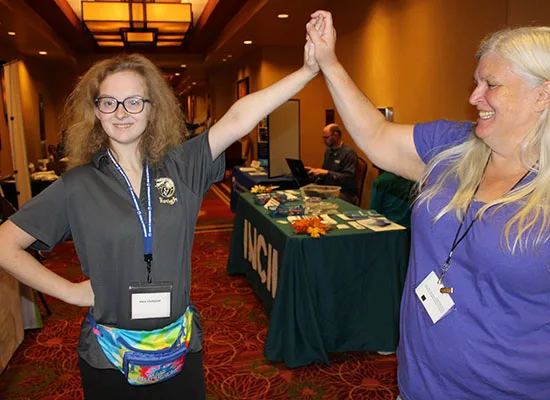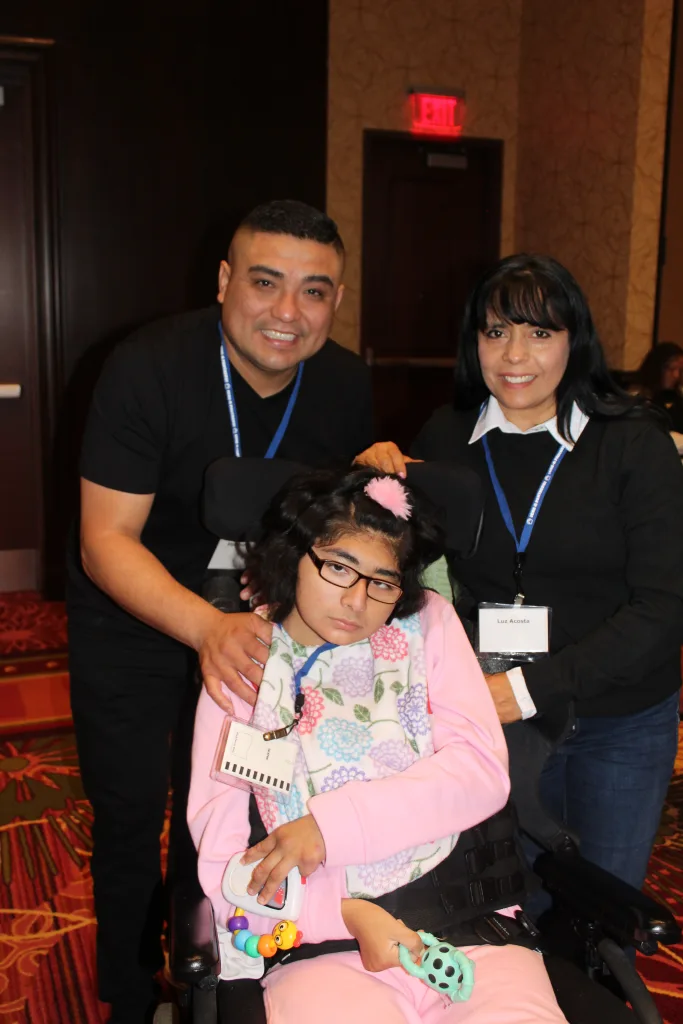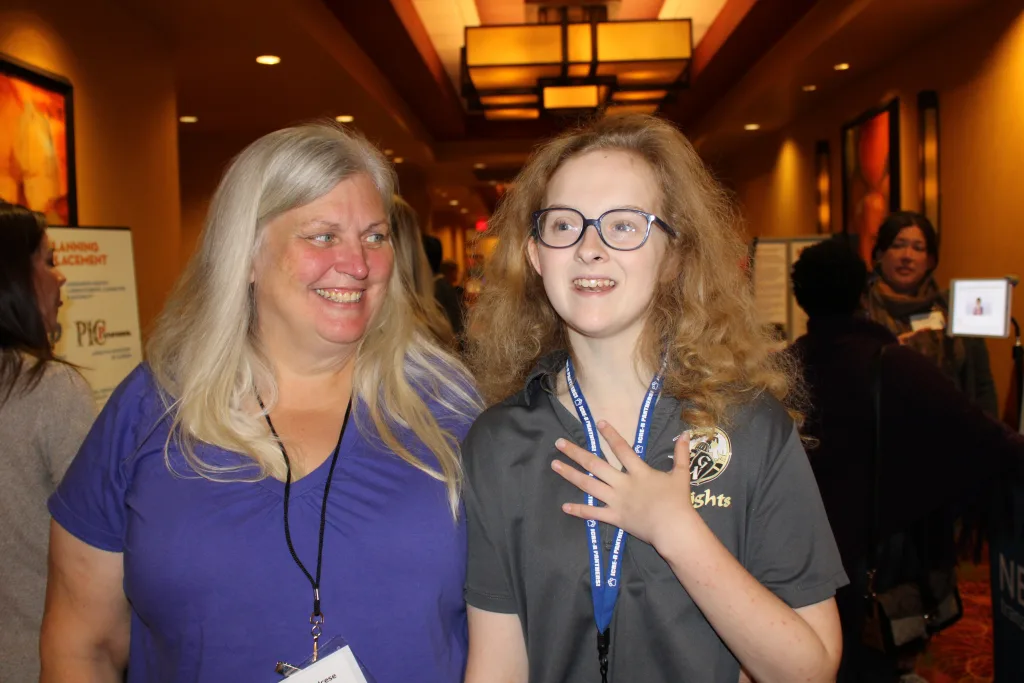Gain Resources and Strategies to Help Your Child Prepare for Adulthood

The 2024 Illinois Statewide Transition Conference is happening on Nov. 7-8 in Springfield
Luz Diaz said she struggled emotionally before attending the Illinois Statewide Transition Conference.
She felt isolated and unsure of the future for her daughter, Ariana, now 20. Ariana has cerebral palsy and quadriplegia along with hearing loss and developmental delays.
The knowledge she gained and the connections she made with other families during the 2023 conference immediately lifted her spirits. Luz now feels more hopeful for what lies ahead.
“Before I came here, I was depressed. I felt so lonely. Now that I’ve seen everything here, my thoughts have changed. I don’t feel lonely. I feel like I belong, and I feel like this is my family,” she said. “Now I feel like I’m not alone.”

The Diaz family were among 370 people who attended the 2023 transition conference in person in Bloomington-Normal.
The conference, titled “Stepping Stones of Transition,” returns for 2024 at the Crowne Plaza in Springfield, Ill., on Nov. 7-8. This year’s event is in person only.
The conference highlights opportunities and resources available for youth and young adults with disabilities and complex medical needs as they transition to adulthood. It’s a “one-stop shop” for gaining valuable resources, making connections and learning alongside individuals who are on the same journey.
The “Stepping Stones of Transition” conference is for youth, parents, caregivers, vocational specialists, healthcare providers, educators and others who work with youth and young adults with disabilities.
Youth and young adults can visit vendors, attend workshops and learn how to plan for their future, including:
- What happens after I leave high school?
- How do I sort through the maze of resources?
- What steps can I take now to prepare for upcoming changes?
- What skills are important for me to develop?
Highlights for 2024 will include learning about supported decision-making from keynote speaker and self-advocate Derek Heard along with Allison Cohen Hall from the Center on Youth Voice, Youth Choice.
You can also attend sessions on:
- Self-determination
- Advocacy
- Employment
- Future planning
- Post-secondary education
- Health care
The Division of Specialized Care for Children (DSCC) helps sponsor the transition conference and serves on its steering committee. We also can pay for the conference-related expenses for our participant families to attend.
DSCC paid the conference-related expenses for 25 DSCC participant families to attend the 2023 conference that took place in Bloomington-Normal.
“An Amazing Opportunity to Learn and Connect”

DSCC participant Vera Lynn Lindquist, 18, attended the transition conference both in 2022 and 2023. She has autism, attention-deficit hyperactivity disorder, anxiety disorder from childhood, tinnitus and hearing loss.
Vera enjoyed exploring the transition conference’s booths and sharing about the goals she has worked on.
“I know a lot more about autism awareness and speaking up and speaking out…” Vera said. “I’ve self-advocated at school. I reached out to my teacher on my laptop, I emailed him. I was behind on a lesson and let him know. He came and helped (me). It made all my teachers very happy.”
Vera attended the conference both years with her grandmother and legal guardian, Cheryl Calcese.
“We’ve used many of the independence and decision-making strategies we learned about,” Cheryl said. “Vera got a debit card. She has a money limit on it when she goes out for pizza and other group social events. She has an app on her phone to figure out the tax and tip. She adjusts everything according to her budget. She’s doing well with that and hasn’t gone over her budget once!”
The transition conference also gave Vera an opportunity to build her self-esteem and self-advocacy skills.
“She feels very comfortable at this conference, and it shows. She’s visiting with vendors and participating in sessions. Here her independence is shining. It’s very cool,” Cheryl said.
Cheryl also gained more resources and knowledge for herself.
“It’s always an amazing opportunity to learn and connect,” she said. “Thanks to the conference, I understand more about legal guardianship for adults and where to go for the paperwork for free or low-cost.”
Cheryl also learned more about the Americans with Disabilities Act (ADA).
“Vera and other students with disabilities had to miss their school homecoming,” she said. “In one of the sessions, I learned that the ADA covers social events. I connected with an organization that can help me make sure these students won’t miss their prom.”
Ariana’s mom, Luz, said she is grateful to everyone who organizes the conference so she can help give Ariana the best quality of life as she grows into adulthood.
Ariana’s father, Edgar, said he felt like the world was closing in on him before he attended the conference. By the end of last year’s event, he said he felt motivated after learning how conference speakers with disabilities advocated for themselves to have greater independence and a better quality of life.
Register and See the 2024 Schedule
The general public and professionals can visit the Statewide Transition Conference website to register and see more details.
For DSCC families, the conference schedule and more details are available:
- In English at: https://go.uic.edu/DSCC2024TransitionConferenceInfo
- In Spanish at: https://go.uic.edu/DSCC2024TransitionConferenceInfoSp
DSCC participants can register online:
- DSCC Transition Conference Sign-Up in English
- DSCC Transition Conference Sign-Up in Spanish
The deadline to register is Oct. 18. Please note that space is limited. Registration may close earlier if all spaces are filled.
Need financial help to attend?
If you are a DSCC participant family, we may be able to fund the conference-related expenses for your child and family, caregivers, nurse and/or personal attendant. These expenses include the cost of the hotel and transportation.
The Illinois Statewide Transition Conference Steering Committee has also set up a scholarship program to help youth with disabilities and their families attend the conference. The scholarship is open to:
- Individuals with disabilities
- Immediate family members of a person with a disability
- Guardians for a person with a disability
The amount of scholarship money available depends on each person’s needs.
Please fill out this scholarship form to apply. (The scholarship form is also available in Spanish.)
The deadline to apply for the conference scholarship is Oct. 18.
For more details or help with registration, please contact DSCC Title V Transition Specialist Claire Cook at (800) 322-3722, ext. 21812, or clairer3@uic.edu.
New Law Empowers Adults With Disabilities to Make Their Own Choices

The Supported Decision-Making Act takes effect Feb. 27 and allows individuals with disabilities to make decisions with help from trusted supporters
When making decisions, we all rely on help and advice to choose what’s right for us.
A new Illinois law ensures people with disabilities can get the help they need to make decisions for their own lives.
The Supported Decision-Making Act empowers individuals with disabilities to make their own choices with the right support. It takes effect on Feb. 27.
Research shows that when persons with disabilities have more control over their lives, they experience better health and wellbeing. However, many persons with disabilities have faced unnecessary and restrictive guardianships once they turn 18 simply because of their disability.
Supported decision-making is an alternative to guardianship. It allows individuals with disabilities to identify a supporter. This supporter can help interpret information, weigh options and help communicate the person’s decisions in certain areas as needed.
These areas can include:
- Where to live
- Medical care or counseling
- Money
- Work
- School
- Public benefits and more
An identified supporter is someone the person with disabilities knows and trusts. It can be:
- A friend
- A family member
- A co-worker or colleague
- A person with professional skills
Under the act, the person with disabilities fills out a Supported Decision-Making Agreement. The agreement identifies the supporter and what areas the person with disabilities needs support with.
This agreement ensures that the person with disabilities makes decisions and not the identified supporter.
This process promotes self-sufficiency and control for individuals with disabilities.
Illinois is among several states that have supported decision-making laws in place.
The Illinois Guardianship and Advocacy Commission has many resources to explain the new Supported Decision-Making Act. These include:
- Supported Decision-Making Fact Sheet
- Supported Decision-Making Frequently Asked Questions
- Supported Decision-Making Training for Persons With Disabilities
Family Matters Parent Training & Information Center is also hosting an upcoming webinar on the Supported Decision-Making Act.
The presentation will provide an overview of the law. It will also review the contents of a Supported Decision-Making Agreement and share examples of how supported decision-making works.
The “Supported Decision-Making in Illinois: What Is It and How Does It Work?” webinar will take place at 11 a.m. Feb. 22.
Additional resources on supported-decision making are available in the Guardianship and Alternatives section of our Transition Tools.


